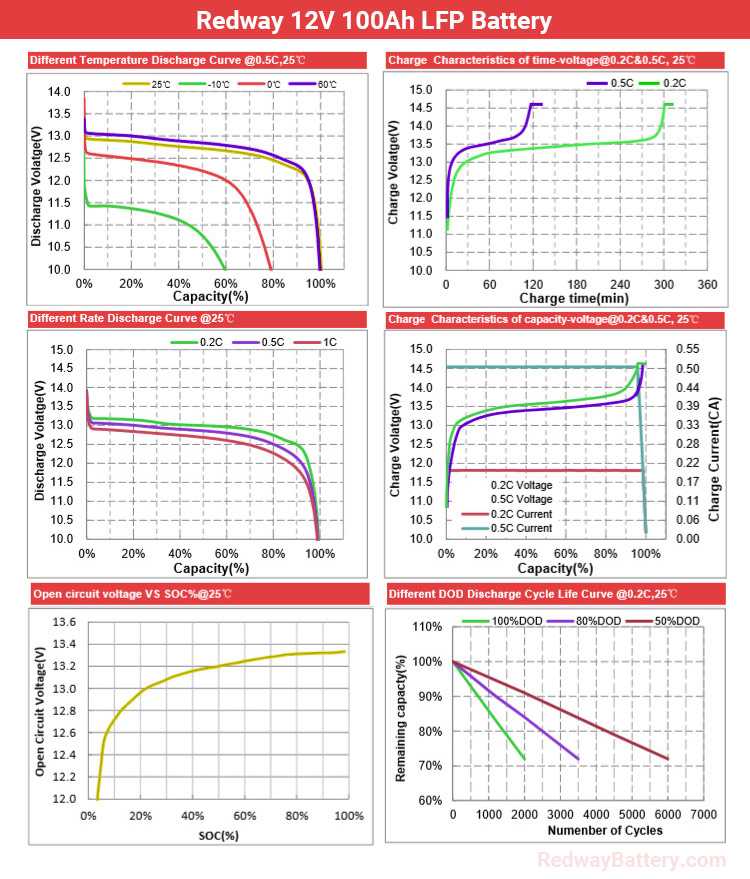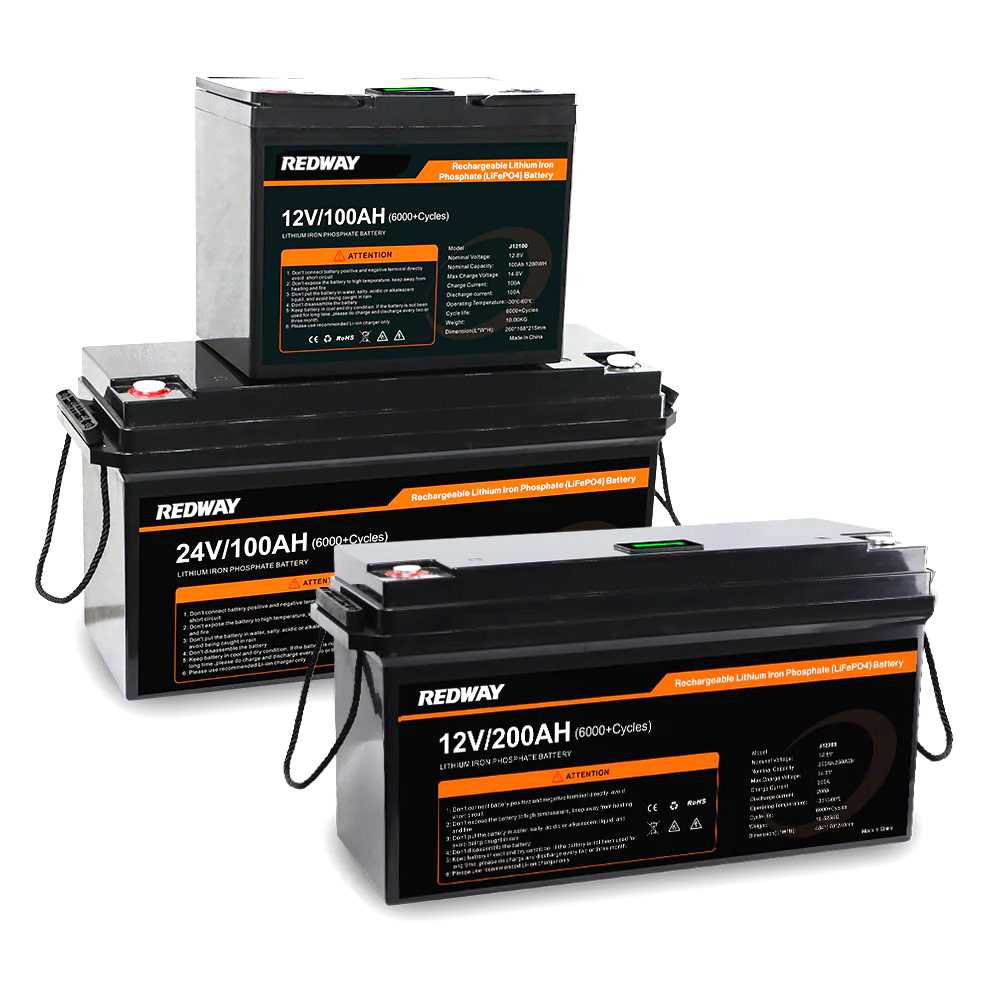Yes, LiFePO4 (Lithium Iron Phosphate) batteries are considered deep cycle batteries. They are designed to be discharged and recharged repeatedly over long periods, making them ideal for applications such as solar energy storage, electric vehicles, and marine systems. Their ability to handle deep discharges without significant degradation sets them apart from other battery types.
What is a deep cycle battery?
Deep cycle batteries play a crucial role in providing sustained power for extended durations in applications like renewable energy, electric vehicles, and marine setups. Here’s a concise breakdown highlighting their key features:
- Sustained Energy Delivery:
- Designed for steady, prolonged power output, deep cycle batteries excel in applications requiring a consistent flow of energy. Unlike car batteries, they are ideal for scenarios such as renewable energy systems and off-grid setups.
- Repeated Charging Cycles:
- Deep cycle batteries stand out for their resilience to frequent charging and discharging cycles without losing capacity. This durability makes them well-suited for situations where reliable and enduring power is essential, such as in marine vessels or during cloudy days in solar setups.
- Thicker Plates, Higher Capacity:
- Distinguished by thicker plates and higher reserve capacities, deep cycle batteries can store and release larger amounts of energy gradually. This feature prevents significant voltage drops, ensuring a reliable and continuous power supply.
Deep cycle batteries come in various types, with lead-acid being common in older designs. However, newer technologies like LiFePO4 offer more efficiency and advantages, setting them apart as superior alternatives in contemporary applications.

The differences between LiFePO4 and traditional deep cycle batteries
LiFePO4 (Lithium Iron Phosphate) batteries have emerged as a superior alternative to traditional deep cycle batteries, primarily due to their advanced chemistry. Here’s a streamlined breakdown of their key advantages:
- Advanced Chemistry for Enhanced Performance:
- LiFePO4 batteries utilize lithium-ion technology, offering a higher energy density. This means they can store more power in a compact, lightweight design—ideal for applications where space and weight are critical.
- Extended Lifespan and Reduced Downtime:
- A standout feature of LiFePO4 is its significantly longer lifespan compared to traditional deep cycle batteries. With up to 2000 cycles or more, these batteries require fewer replacements, translating into reduced costs and less downtime due to battery failure.
- Efficient Charge Retention and Faster Charging:
- LiFePO4 excels in charge retention, maintaining power for longer periods, making it suitable for intermittent use. Additionally, these batteries offer faster charging times, accepting high currents without heat-related issues—minimizing downtime during recharging.
- Enhanced Safety Features:
- Safety is a paramount concern, and LiFePO4 addresses this with inherent stability. Unlike other lithium-ion cells, they are less prone to thermal runaway or explosion risks, ensuring a safer option for various applications.
While there may be an initial cost difference, the long-term benefits of LiFePO4, including extended lifespan, faster charging, and increased safety, make it a worthwhile investment for reliable power storage in applications like RVs, marine vessels, or renewable energy systems.
Advantages of LiFePO4 deep cycle batteries
LiFePO4 deep cycle batteries stand out as a superior choice for various applications, offering compelling advantages over traditional counterparts. Here’s a concise breakdown of these key benefits:
- Exceptional Lifespan:
- LiFePO4 batteries outshine lead-acid batteries by lasting up to 10 times longer. This prolonged lifespan translates to less frequent replacements, ultimately reducing long-term costs.
- High Energy Density:
- With a high energy density, LiFePO4 batteries can store more energy in a smaller, lighter package. This makes them perfect for applications with limited space and weight requirements, such as in RVs or marine vessels.
- Higher Charging Efficiency:
- LiFePO4 batteries boast superior charging efficiency, allowing for faster charging rates without compromising capacity or risking damage. This feature results in quicker recharges and shorter downtime between uses.
- Excellent Performance in Extreme Temperatures:
- Unlike batteries that struggle in extreme temperatures, LiFePO4 maintains its capacity and functionality even in harsh conditions. This reliability ensures consistent performance regardless of environmental challenges.
- Built-In Safety Mechanisms:
- Safety is a top priority with LiFePO4 batteries, featuring inherent stability and built-in protection against overcharging, short circuits, and thermal runaway events. This makes them a secure choice for applications where safety is paramount.
In conclusion, the advantages offered by LiFePO4 deep cycle batteries make them an excellent and reliable choice, especially when considering longevity, compactness, fast charging capabilities, and safety.

Common uses for LiFePO4 deep cycle batteries
LiFePO4 deep cycle batteries are versatile power solutions with widespread applications across various industries. Here’s a brief overview of their common uses:
- Off-Grid Solar Systems:
- LiFePO4 batteries are a cornerstone in off-grid solar setups, efficiently storing solar-generated energy for use during periods of low sunlight. This reliable energy source reduces dependence on traditional power grids.
- RVs and Marine Applications:
- Ideal for mobile applications, LiFePO4 deep cycle batteries power RVs, boats, and yachts. Their high energy density ensures a sustained power supply for appliances, lighting, and electronic devices while on the move.
- Electric Vehicles (EVs):
- LiFePO4’s extended lifespan and high energy storage capacity make it a preferred choice in electric vehicles. These batteries enable longer travel distances on a single charge, contributing to the efficiency of EVs.
- Backup Power Systems:
- Critical infrastructure, homes, hospitals, and data centers rely on LiFePO4 batteries as dependable backup power sources during unexpected outages or emergencies, ensuring uninterrupted functionality.
- Renewable Energy Storage:
- LiFePO4 batteries play a vital role in storing excess energy generated by renewable sources like wind turbines and hydroelectric plants. This stored energy can be utilized during periods of high demand or when renewable sources are less active.
In conclusion, the adaptability and reliability of LiFePO4 deep cycle batteries make them integral to various industries, offering efficient and sustainable power solutions.
How to properly maintain a LiFePO4 battery
While LiFePO4 batteries are renowned for their durability, proper maintenance remains crucial for optimal performance. Here are key tips to ensure your LiFePO4 battery stays in top shape:
- Charge Regularly:
- LiFePO4 batteries thrive when charged regularly, ideally after each use or at least once every few months if idle. This routine charging preserves their efficiency and overall lifespan.
- Avoid Overcharging:
- Protect your battery from overcharging by using a dedicated LiFePO4 charger equipped with safeguards. Overcharging can harm the cells and diminish the battery’s longevity.
- Keep It Cool:
- Operating and storing LiFePO4 batteries in a cool environment is essential. Excessive heat adversely affects their performance, so maintaining a moderate temperature is key to sustained efficiency.
- Protect from Extreme Temperatures:
- Shield your battery from extreme cold or hot conditions, which can compromise its effectiveness. Prolonged exposure to temperature extremes should be avoided to ensure optimal battery function.
- Monitor Voltage Levels:
- Regularly check your battery’s voltage using a voltmeter or a battery management system (BMS). This proactive approach helps identify potential issues early, allowing for timely intervention and prevention of further damage.
By adhering to these straightforward maintenance practices, you can significantly extend the lifespan of your LiFePO4 deep cycle battery, providing reliable power for various applications with peace of mind.
Comparison between the lifespan of LiFePO4 and traditional deep cycle batteries
Choosing the right battery type is crucial for long-term value. Let’s compare LiFePO4 deep cycle batteries with traditional deep cycle batteries in terms of lifespan.
- Impressive Lifespan:
- LiFePO4 batteries stand out with a remarkable lifespan of up to 10 years, offering longevity that surpasses traditional deep cycle batteries, typically lasting only 3-5 years.
- Resilience Against Sulfation:
- LiFePO4 batteries avoid the common issue of sulfation, a process that hampers lead-acid batteries’ lifespan. This advantage allows LiFePO4 batteries to maintain their capacity for an extended period.
- Extended Charge/Discharge Cycles:
- LiFePO4 batteries excel in handling cycles, enduring at least 2,000 cycles without significant performance decline. Traditional deep cycle batteries have a more limited cycle life before capacity loss.
- Deeper Discharge Capability:
- LiFePO4 technology permits deeper discharges without causing harm to the battery cells. In contrast, traditional deep cycle batteries may suffer irreversible damage if subjected to deep discharges too frequently.
In summary, LiFePO4 deep cycle batteries not only offer a substantially longer lifespan but also provide consistent high performance throughout, making them a superior choice for durable and reliable power storage solutions.
Who is the Best OEM manufacturer of Deep Cycle Lithium batteries?
Redway Deep Cycle Lithium batteries boast esteemed certifications, including UL1973, UL2580, and IEC62133, ensuring adherence to both US and international transportation regulations for air, ground, marine, and train travel. Furthermore, certain models have received industrial certification under ISO 9001:2015 and ISO 14001:2015. Redway provides tailored solutions to meet unique requirements, offering customization for Deep Cycle lithium-ion batteries and raw materials. Embracing OEM/ODM, we facilitate the imprinting of your logo or brand name on the battery body. Click to find more about Redway Deep Cycle Lithium batteries.



